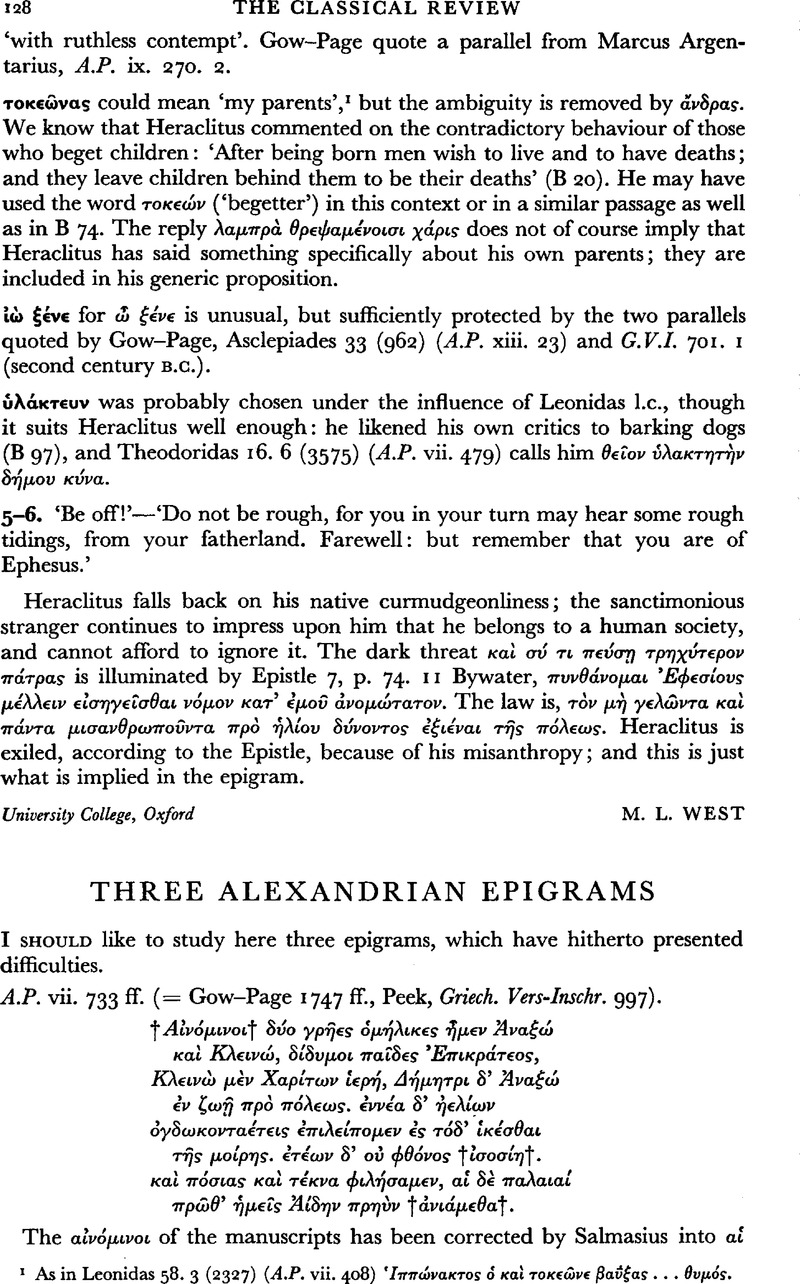No CrossRef data available.
Published online by Cambridge University Press: 27 February 2009

page 128 note 1 As in Leonidas 58. 3 (2327) (A.P. vii. 408) Ιππώνακτος ⋯ κα⋯ τοκε⋯νε βα![]() ξας…θυμ⋯ς.
ξας…θυμ⋯ς.
page 129 note 1 For this reason, Gow-Page leave in their text αἰν⋯μινοι between cruces, whilst Peek, after considering αἱ φθ⋯μεναι, prefers the emendation κλῃδο⋯χοι. Jacobs, ad loc. (i. 2 [= vii], p. 163) noted that aequitatis et justitiae mentio ab hoc loco aliena est, and (cf. Peek's apparatus) proposed κοιν⋯βιοι.
page 129 note 2 Jacobs (cf. Delectus, p. 272, and Dübner, ad loc.) was the first to note that nomen ⋯λικ⋯η is ambigue dictum: he interpreted the expression νομ⋯μης ⋯λικ⋯ης as being said de aetate morti matura (with reference to line 2, Μοῖρα δ⋯ δειμα⋯νειν ο⋯ δεδ⋯ηκε ν⋯μονς) and de aetate qua per leges petere licebat honores et magistratus, but I think that the context (cf. line 3, ⋯λλ⋯ μιν ⋯ρι⋯ξασα σοψ⋯ν ἤμερσε θεμ⋯στων) supports the interpretation ‘age at which the deceased would have attained a full knowledge of legislation’. Cf. Mattsson, A., Untersuch. zur Epigrammsammlung des Agathias (Lund, 1942), pp. 41 fGoogle Scholar.
page 129 note 3 Significantly enough, Lattimore, op. cit., does not mention this motif in his already quoted excellent monograph (cf., however, pp. 212 ff.).
page 129 note 4 The coexistence in the genre of the motif in question with the opposite motif (‘those dear to the gods die young’: δν οἱ θεο⋯ ψιλο⋯σιν ⋯ποθνῄσκει ν⋯ος, Men. fr. 111K.2; cf. Kaibel, Epigr. 153. 14 and Peek 1646) would be interesting to study; on the φθ⋯νος-motif (line 6, in the epigram under discussion, ⋯τ⋯ων οὐ φθ⋯νος) cf. Peek 989. 6, 1114, 1139, 1648 and Kaibel, Epigr., Index V, s.v. β⋯σκανος, βασκ⋯νω.
page 130 note 1 Cf., e.g., Gow-Page on χαλκ⋯δετον (4033), δυσδ⋯κρυτε (4082), and πυριβλ⋯τους (4477).
page 130 note 2 On Meleager's ‘genaue Bekanntschaft’ of Homer's diction cf. Radinger, , Meleager, pp. 62 fGoogle Scholar. Meleager was, of course, ‘ein doctus poëta, wie alle Alexandriner’, such as Leonidas (Geffcken, Leonidas, p. 140).
page 130 note 3 Such jeux d'esprit are not uncommon in the epigrammatists: cf. for Meleager the perplexing μαρ⋯νας at Gow-Page 4382, which seems at first impossible but which is intended as a point of Homeric flavour, as I have tried to demonstrate (Rev. Ét. Gr., forthcoming).
page 131 note 1 ἄρτι γ⋯ρ ⋯κ ν⋯⋯ς με μ⋯νον π⋯δα θ⋯ντ᾽ ⋯π⋯ γαῖαν means literally ‘no sooner (ἄρτι) had I merely (μ⋯νον) set foot on the shore’: the adverb μ⋯νον qualifies the verb θ⋯νια (on π⋯δα τ⋯θημι = ‘set foot’ cf. L.S.J. s.v. τ⋯θνι, A): ν⋯νον, in other words, is not an adjective referring either to νε or to π⋯δα. For such Alexandrian types of intentionally abnormalWortstellung cf. Ap. Rh. i. 903 μο⋯ν⋯ν με … λ⋯σειαν and A.P. vii. 29, 5 εἰς…σε μο⋯νον…εἶχεν ⋯κηβολ⋯ας (discussion in C.R. lxxxi [1967], p. 19).
page 131 note 2 Prosaic ingredients are, of course, not absent from Meleager's diction; cf. Page's commentary, passim.
page 131 note 3 Cf. Radinger, op. cit., p. 75, n. 2. On Meleager's reason for choosing a palm-tree with reference to Aratus cf. Gow-Page, p. 104.